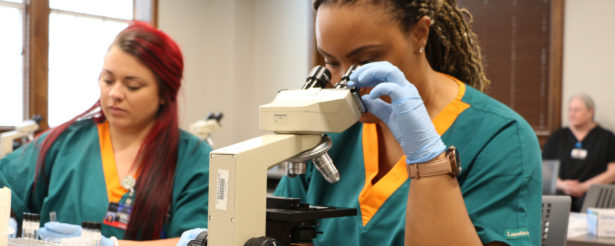In the southwestern-most corner of Tennessee, nursing students learn suturing and other skills vital to their future roles as nurse-midwives who will serve some of the state’s most vulnerable patients.
They are among 16 students in the new Doctor of Nursing Practice program in nurse midwifery at the UT Health Science Center’s College of Nursing in Memphis. It is the only path to nurse midwifery offered at a public college or university in Tennessee.
The UTHSC nurse midwifery program, which began in 2021, has the goal of improving health outcomes for pregnant women and their babies in Tennessee. The state has a high maternal mortality rate—34.6 deaths per 100,000 live births for 2018-2020 and the fourth highest in the nation—and it has a dearth of providers in rural areas, says Professor Kate Fouquier, the coordinator of UTHSC’s program in nurse midwifery. The U.S. Centers for Disease Control and Prevention reports even higher national maternal mortality rates for Black women, with 55.3 deaths per 100,000 live births. In Tennessee, Black women are 2.5 times more likely to die than white women.
Changing those numbers inspired Memphis-native Damaris Brooks to enroll in the three-year nurse-midwifery program. In 2021, she completed the accelerated Bachelor of Science in nursing program at the UTHSC College of Nursing and didn’t hesitate to apply for the nurse-midwifery program when it opened.
“As a future nurse-midwife, I hope to aid in rectifying the maternal health crisis, particularly serving Black and minority women and women in rural communities. I want to partner with women to establish or maintain a realistic, healthy lifestyle for them and their community,” Brooks says.
“Black women and women in rural communities lack true health-care equity, and I believe it is my responsibility to be a part of the solution.”
The problem has been exacerbated with Tennessee suffering 16 hospital closures, 13 of them rural, since 2010—the second highest rate in the United States. Of the 95 counties that make up the state, 82 percent are rural, according to the Tennessee Hospital Association.
Often, when a hospital closes in a rural area, the region also loses health-care specialists, including those who provide obstetrics and gynecology care, Fouquier says. Fewer than 7 percent of OB-GYNs work in rural areas. Residents of 35 Tennessee counties have no access to maternity care, according to the 2022 March of Dimes report on maternity-care deserts.
“As OB/GYN providers retire or leave rural communities, midwifery services can help provide a solution,” Fouquier says. “Training certified nurse-midwives/certified midwives is less costly in both time and money, so this is a workforce investment. Midwifery, which is still predominately a female profession, is appealing because it allows trained midwives to stay in their communities. This provides much-needed access to care, and there is abundant evidence supporting improved outcomes with midwifery-led care.”
UTHSC’s nurse midwifery concentration provides the registered nurse with the specialized knowledge and skills to offer family-centered primary care. In addition to pregnancy and childbirth care, services provided by nurse-midwives include primary care, annual gynecology wellness visits, family planning, and fertility and newborn care during the first 28 days of life.
“Research has shown that midwife-led models of maternity care result in fewer preterm births, decreased fetal and neonatal deaths, and fewer intrapartum interventions, reducing cost and increasing patient satisfaction,” UTHSC College of Nursing Dean Wendy Likes says. “We are pleased to bring this program to the Mid-South to improve access and outcomes for women, their babies and their families.”
Five of the nurse midwifery students at UTHSC have their tuition covered by a Health Resources and Services Administration grant focused on improving maternal and obstetrical services for underserved and rural populations in the Mississippi River Delta region.
Jasmine Walker is one of those students.
“I sought a doctor of nursing practice in midwifery for many reasons, but my passion for caring for women and their babies outweighs all the others,” she says. “I am excited to provide exceptional, evidenced-based, equal care to all women. I hope to make some significant changes in the way care is offered to women while reducing overall complications, resulting in a decrease in infant and maternal mortality rates and unnecessary invasive procedures.”
Being part of the solution is what prompted Fouquier to help launch the program at UTHSC.
“I have always been passionate about midwifery and what we can offer women,” she says. “The southeastern U.S. has very few midwives but has the greatest need with our high maternal/infant mortality rates. I wanted to end my career by passing along my passion for midwifery and the clients we serve.”
Learn more about UTHSC’s nurse-midwifery program at uthsc.edu/nursing/dnp/midwifery.php.

